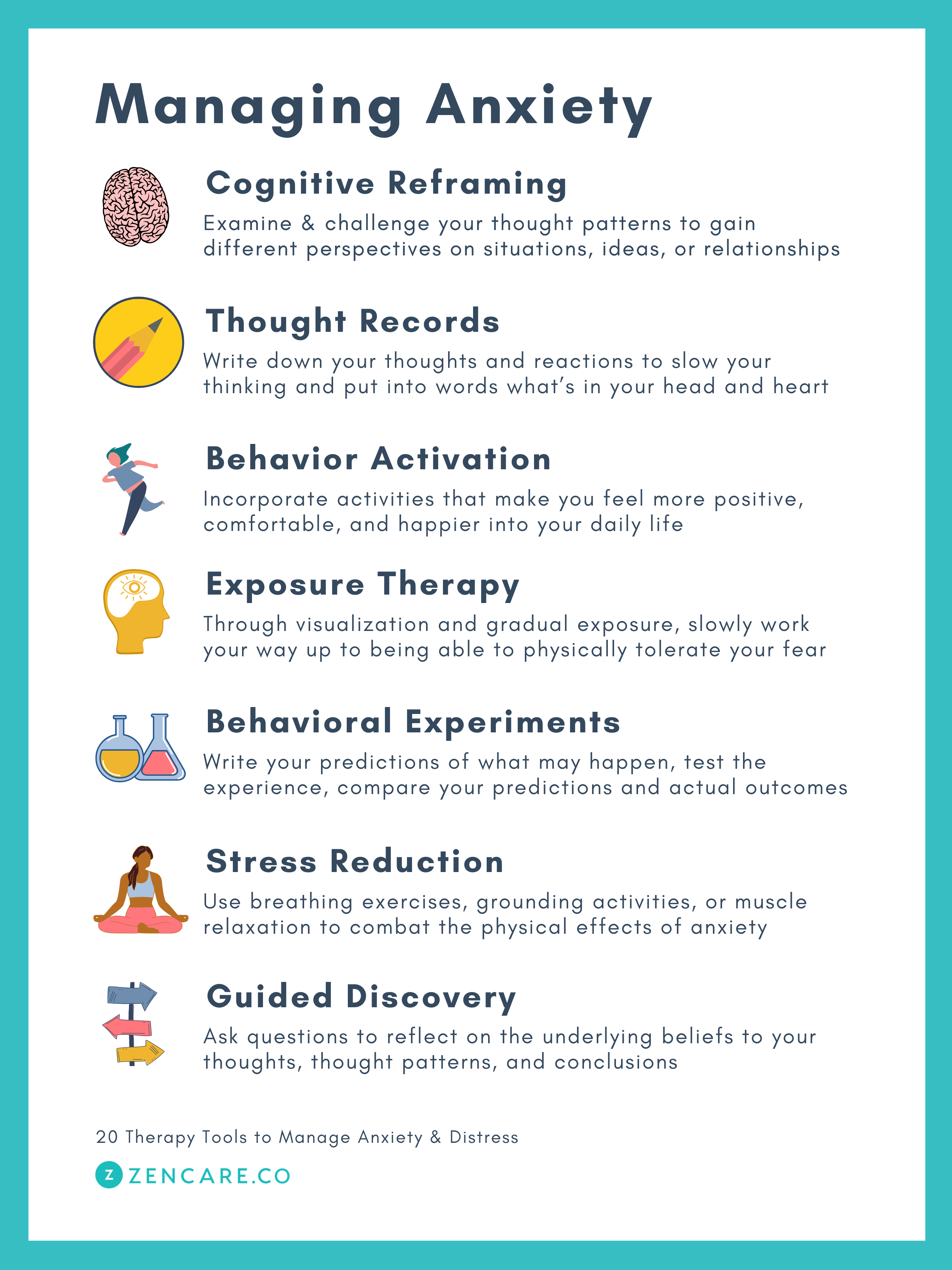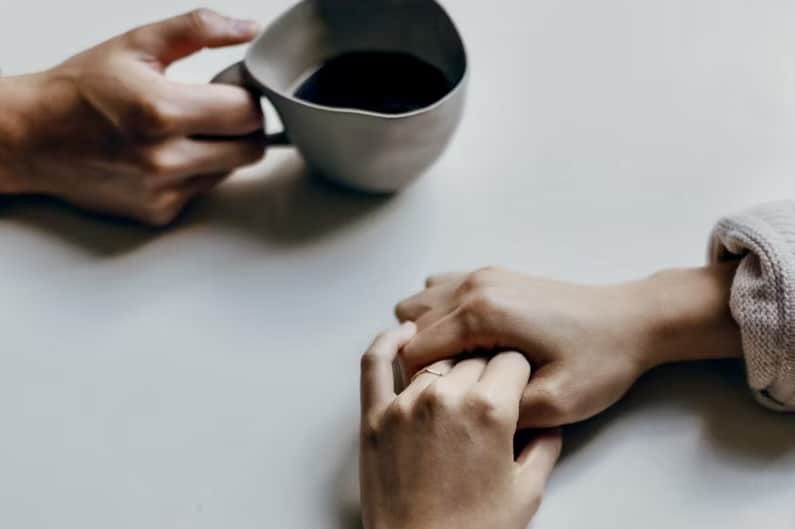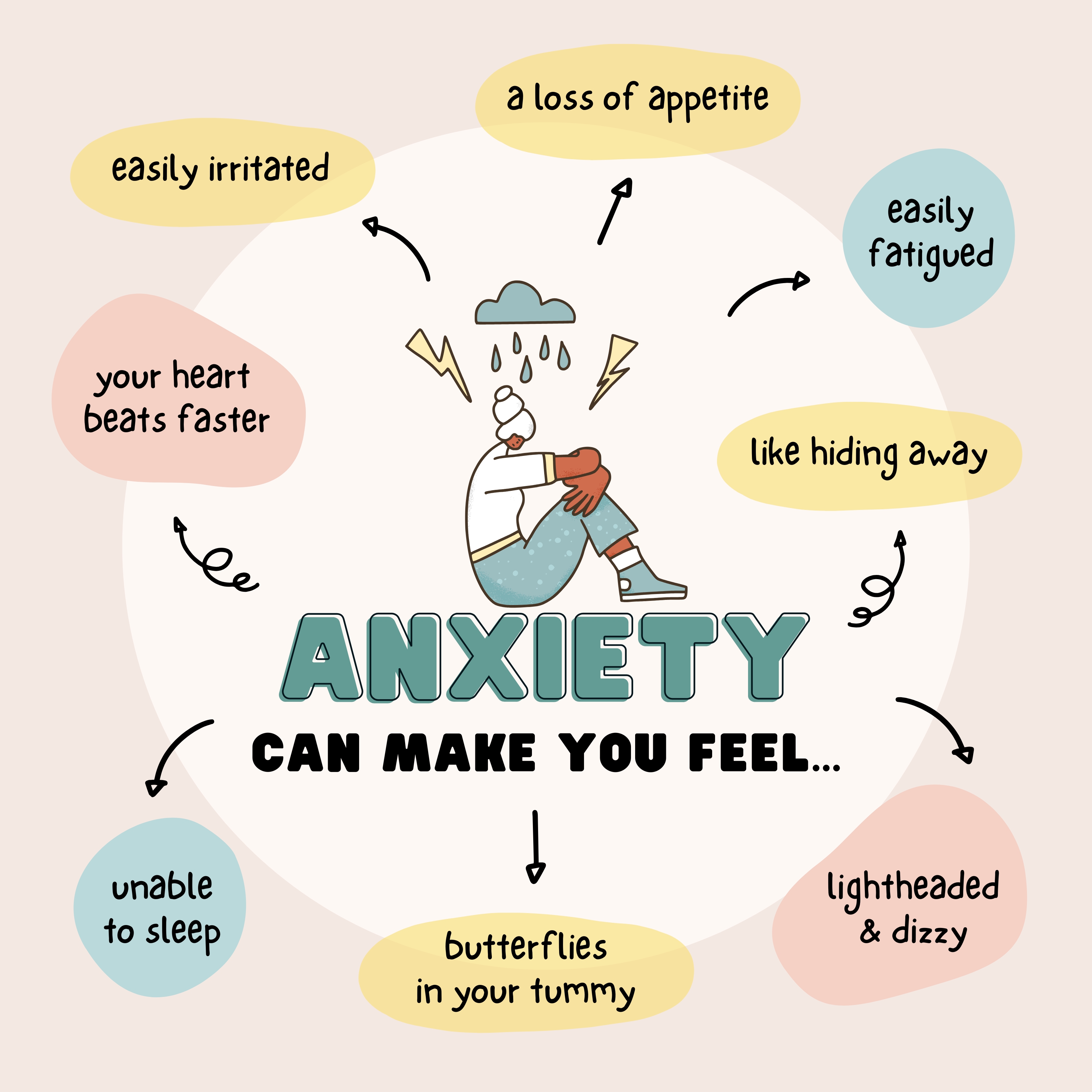Private care from a licensed therapist for anxiety in your area
Private care from a licensed therapist for anxiety in your area
Blog Article
Exploring Various Strategies in Counselling for Anxiety Disorder for Long-term Modification
When tackling anxiety conditions, it's essential to discover a selection of counseling techniques. Each method provides distinct understandings and devices to aid you manage your signs efficiently. You may locate that incorporating techniques can yield the very best results. Recognizing the nuances of these strategies is vital to fostering long-term modification. What if the ideal combination could release a new level of psychological well-being for you?
Understanding Anxiety Problems: A Brief Overview
Stress and anxiety disorders, which affect countless people worldwide, can substantially influence everyday life. You may experience overwhelming sensations of worry or fret that seem unmanageable. These feelings can result in physical signs like a racing heart, sweating, or also dizziness. Typical kinds of stress and anxiety conditions include generalised anxiety condition, panic disorder, and social anxiety disorder. Each has one-of-a-kind indicators, but they all share a propensity to disrupt your regular and relationships.Understanding the root triggers of your stress and anxiety is crucial. It could originate from genes, brain chemistry, or life experiences. Identifying your triggers can aid you manage your responses better. It is essential to keep in mind that you're not the only one in this battle. Lots of people face similar obstacles, and looking for help is a strong action towards feeling better. By discovering anxiousness problems, you're currently on the path to understanding and handling your problem better.
Cognitive-Behavioral Therapy: Testing Negative Thought Patterns
In Cognitive-Behavioral Treatment, you'll begin by recognizing the adverse idea triggers that add to your stress and anxiety. You'll function on changing them with more favorable options once you acknowledge these thoughts. With each other, you'll develop effective coping approaches to assist manage your stress and anxiety in day-to-day situations.
Identifying Negative Thought Triggers

Acknowledging the specific triggers behind your unfavorable thoughts can be vital in taking care of anxiety when you run into moments of distress. Start by focusing on situations that prompt sensations of worry or anxiety. Is it a jampacked room, a forthcoming target date, or a conversation with specific people? Take down these circumstances in a journal. This will help you identify patterns in your reasoning. Notification physical feelings that accompany your unfavorable thoughts, like a racing heart or rigidity in your chest. By identifying these triggers, you gain understanding into what's fueling your anxiety. Comprehending these connections is the very first step in testing those thoughts and inevitably restoring control over your psychological feedbacks.
Changing Ideas With Positives
Challenging adverse idea patterns is a necessary step in transforming your attitude and reducing stress and anxiety. You might often locate on your own caught in cycles of self-doubt or devastating thinking. Rather than letting these thoughts dictate your sensations, practice changing them with sensible alternatives or favorable affirmations. For circumstances, when you think, "I can't handle this," change it to, "I can handle challenges one step at a time." This straightforward modification can considerably affect your emotional state. On a regular basis recognizing and responding to these unfavorable thoughts assists create a much healthier inner dialogue. Remember, it requires time and effort, yet constantly exercising this method can lead to enduring adjustment, empowering you to deal with stress and anxiety with restored self-confidence and resilience.
Structure Coping Methods Together
Replacing adverse ideas is just the beginning of taking care of stress and anxiety efficiently. To develop lasting modification, you need to build coping approaches that equip you. Cognitive-Behavioral Treatment (CBT) aids you recognize and test those purposeless idea patterns. With each other, you and your counselor can explore just how these thoughts impact your sensations and behaviors.Start by developing practical techniques, like journaling or mindfulness exercises, that allow you to challenge stress and anxiety head-on. When you encounter your fears gradually, you'll learn to respond differently.

Mindfulness and Acceptance-Based Approaches: Growing Present-Moment Awareness
As you browse the complexities of anxiety, integrating mindfulness and acceptance-based approaches can significantly boost your ability to grow present-moment recognition. By focusing on the below and currently, you'll find that you can observe your ideas and sensations without judgment (Counseling services for anxiety). This technique helps you acknowledge your stress and anxiety without really feeling overwhelmed by it.Engaging in mindfulness exercises, such as deep breathing, body scans, or assisted meditations, allows you to ground on your own in your present experience. Acceptance-based approaches motivate you to embrace your emotions instead of combat against them. When you accept your sensations, they lose their power over you.Incorporating these practices right into your everyday regimen can change just how you react to anxiousness. You'll develop resilience and discover to navigate demanding circumstances with higher ease. Eventually, cultivating present-moment awareness lays the foundation for lasting adjustment, equipping you to lead a much more meeting life
Exposure Therapy: Challenging Worries Gradually
Exposure therapy helps you face your worries in a steady method, making it less frustrating. You'll discover strategies to encounter anxiety-provoking circumstances action by step, Counseling services for anxiety while additionally developing coping techniques to manage your reactions. This method empowers you to take control and reduce anxiety over time.
Gradual Direct Exposure Strategies

When dealing with anxiousness, progressively facing your anxieties can be a powerful means to gain back control. This strategy, known as gradual direct exposure, involves slowly revealing yourself to the scenarios or objects that cause your anxiety. Begin with less daunting scenarios and slowly function your way approximately more difficult ones. If you're scared of public speaking, you might begin by speaking in front of a mirror, after that progress to sharing thoughts with a good friend, and at some point attend to a little team. Each step assists desensitize you to the fear, building your confidence with time. Remember, it's necessary to rate on your own and commemorate small success as you move through this procedure, reinforcing your ability to handle anxiousness effectively.
Building Coping Techniques
Building reliable coping strategies is crucial for managing stress and anxiety, especially as you challenge your anxieties gradually - Counseling services for anxiety. One effective method is exposure treatment, where you begin by facing your concerns in a regulated way. Begin with less daunting circumstances and slowly work your way approximately more challenging scenarios. This progressive exposure aids desensitize you to anxiety triggers, making them much less overwhelming.Incorporate leisure methods, such as deep breathing or mindfulness, to relax your mind during direct exposure. Track your progression, commemorating little victories in the process to increase your confidence. Bear in mind, it's all right to take your time; the objective isn't perfection however consistent improvement. By building these approaches, you'll encourage on your own to navigate anxiety and welcome life a lot more completely
Psychodynamic Therapy: Uncovering Source of Anxiety
Psychodynamic treatment discovers the subconscious mind, revealing the origin of your anxiousness. By examining your thoughts, sensations, and past experiences, this technique assists you uncover underlying conflicts and unsolved problems that may contribute to your present anxiety. You'll function with a therapist to explore youth experiences, relationships, and psychological patterns that form your reactions today.As you obtain insight right into these much deeper layers of your mind, you'll begin to acknowledge just how past occasions influence your existing behavior. This understanding can bring about catharsis, allowing you to process emotions you may have suppressed.Through the restorative relationship, you can additionally identify defense reaction that may have developed over time, using a more clear path to transform. Eventually, psychodynamic treatment equips you with the tools to address your anxiety at its core, advertising long lasting transformation in your emotional health.
Integrative and Holistic Approaches: Incorporating Techniques for Greater Effectiveness
Incorporating numerous healing techniques can improve your trip towards managing anxiety a lot more properly. By combining aspects from cognitive-behavioral therapy, mindfulness methods, and all natural strategies, you can develop an individualized method that resolves your one-of-a-kind demands. You could make use of cognitive-behavioral strategies to test unfavorable idea patterns while including mindfulness workouts to ground yourself in the present moment.Additionally, checking out alternative methods such as yoga or meditation can advertise leisure and lower anxiety symptoms. This mix permits you to create higher self-awareness and resilience.Experimenting with these diverse techniques can help you discover what reverberates most with you. Bear in mind, it has to do with discovering a harmony that works, instead of staying with a solitary technique. This integrative technique not only uses instant relief yet likewise fosters long-lasting skills for taking care of anxiousness, equipping you to reclaim control over your life.
The Role of Assistance Solutions: Building Resilience Through Link
While it could seem that taking care of anxiousness is a solitary trip, having a strong support group can play a crucial function in your resilience. Bordering yourself with understanding friends, household, or support system creates a secure area where you can freely share your feelings and experiences. When you link with others, you advise on your own that you're not alone in this struggle.These connections use support and can provide functional coping strategies that have helped others. It's additionally a possibility to obtain perspective; friends can assist you see scenarios differently, lowering sensations of isolation.Moreover, emotional support fosters a feeling of belonging, which can significantly relieve anxiety signs. By leaning on your support group, you can build strength and tackle challenges a lot more properly. Remember, reaching out for aid is an indication of strength, and it can make all the difference in your journey towards managing anxiousness.
Regularly Asked Questions
What Are the Usual Signs And Symptoms of Anxiousness Problems?
You could experience uneasyness, exhaustion, difficulty concentrating, irritability, muscle mass tension, and sleep disruptions. Physical symptoms can include rapid heartbeat, sweating, and shivering. Identifying these indications early can aid you seek appropriate assistance and therapy.
For How Long Does Therapy Normally Last for Stress And Anxiety Conditions?
Therapy for anxiety problems normally lasts anywhere from a couple of weeks to a number of months. It truly depends on your individual demands, progression, and the strategies your specialist uses to help you handle your anxiousness effectively.
Can Drug Be Utilized Together With Therapy for Anxiousness?
Yes, medication can absolutely be utilized along with therapy for anxiety. Combining both methods usually improves treatment efficiency, assisting you handle signs while exploring underlying problems with counseling (Counseling services for anxiety). Constantly consult your healthcare service provider for tailored guidance
Exist Self-Help Techniques for Handling Stress And Anxiety?
Yes, there are numerous self-help techniques for handling anxiousness. You can practice mindfulness, engage in normal exercise, maintain a well balanced diet plan, develop a regular, and make use of deep breathing methods to aid lower stress and anxiety signs and symptoms successfully.
How Do I Know if I Need Professional Assistance for Anxiety?

Report this page